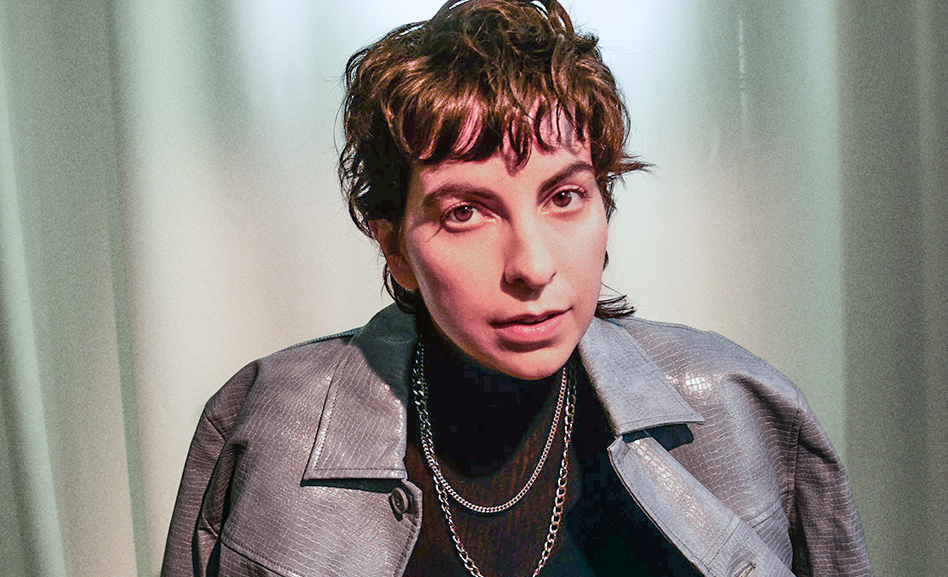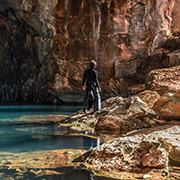
Non-binary artist Becca Mancari performs Friday in Dallas (Photo by Shervin Lainez)
MELISSA WHITLER
Contributing Writer
Non-binary artist Becca Mancari finishes out their tour at Club Dada in Dallas on Friday, Nov. 17. Mancari’s latest album, Left Hand, centers on self-acceptance and connection, the music taking the listener through Mancari’s journey of healing and reconnecting with the earth. The artist has been on tour since September, and before closing out the tour in Dallas, took some time to talk with Dallas Voice about their experience as a queer musician.

The cover of Mancari’s album, Left Hand
Dallas Voice: You just released your newest album, Left Hand, in August. What does this album mean to you? Becca Mancari: It means everything honestly. It’s a record I’ve always wanted to make. I wanted to reflect the emotions of my life with this music, and it’s my first time working as a producer. It really was a catalyst to liberate my life. I feel really limitless in music, and it was very important for me to say what I really wanted to say on this album.
What did you learn about yourself through the process of creating this album? It was the first-time writing music since I started going to therapy. After the COVID-19 pandemic, I was really struggling and wasn’t sure if I wanted to even continue doing music. It changed my perspective on what was important to me, and I saw the value deeply of what I could do as a writer. This is especially true for the queer community, as I want to tell our stories, express sadness, resilience, joy, pain, sorrow. I figured out what it meant to wake up to your own existence in life and share that with others.
What’s it like getting to collaborate with so many talented people, including Julien Baker from Boygenius? It’s always an honor. What’s so cool now is that we’re all just friends, just bros. We hang out together a lot, and it feels like the least interesting thing about my friends is their music, you know.
I go fishing with Brittany Howard and on walks with Julien Baker. Music for us is just having fun. So much of what I record is done in home studios, and we just get to hang out. It’s also important to me to make sure women and queer people and people of color are credited for their contributions to music. With Julien, I knew they were incredible and asked them to engineer their own vocals, which is an opportunity to give her credits.
Where does your musical inspiration come from? For me, it is definitely something that comes from a place I have to really reach for. I’m a Scorpio and more guarded and private, so it’s hard for me just day-to-day talking with people. What I really love is making the sounds of music, the instrumentation. Words are so limiting. I spend a lot of time working on the actual structure of the song, and it helps me process. There’s something about playing on your keyboard, allowing the music to happen in a contained and also limitless way. For this record, I had to work on not being afraid to say even more than I had before.
What do you want people to walk away with after listening to Left Hand? I want them to embrace their own inner power, their inner strength. I want them to face their own shadows. There’s so much shadow work I’ve been doing, facing things I’ve feared. I don’t want people to miss their lives. I’ve always wanted my work and my life to be about more than just myself. It matters how we interact in the world. Healing yourself helps heal the world.
One of the themes of your album is connecting with the earth. What does that mean for you? The song “To Love The Earth” is the second-to-last song we play in the show. It’s kind of like my secular hymn about protecting this place we call home. And the song has so much more relevance and meaning now than when I wrote it. It feels so powerful with everything going on around the world. There are people fighting for their lives; this earth is fighting to survive. We have big opportunities to love each other, and I believe people will heal the earth, not some government or political entity.
I know Dallas is your last show. What has tour been like for you? It’s been amazing! Dallas will be our 36th show in, like, two months. It’s been unbelievable. I’m so proud of the band; we’ve all had deep awakenings to our own abilities. And connecting to our fans has been transformative. I can’t wait for people to see the show. I think it’s the best I’ve ever sounded.
What has been your experience being such a publicly queer artist? It’s definitely had its difficulties. When I first started, I got a lot of push back, and some labels wouldn’t sign me because I was queer. But now I see it as my gift, to do this and do this very well.
Both queer and non-queer people listen to my music. It’s my gift I can give to the world. I can be the person who walks through the door so others in the future can run. There are big things we’re still fighting for. But I’m thankful to keep getting better at my job.
I’m fairly femme presenting, and I think people are afraid of women and feminine people getting older. We’re amazing and not easily fooled, and so powerful. We just keep getting better. And queerness is a way of staying young in mindset, we never stop being curious.
How have you been able to find community and connection? It was really hard when I was young as I didn’t have language for queerness. It wasn’t until high school that I took a women’s literature class and learned about Virginia Wolf. I was like, “Tthat’s me!” And that’s how I know representation matters. I needed it when I was young. When I was older, I worked in this coffee shop and realized the owner was queer. I met all these queer people, and it was really meaningful since I lived in a small town.
My family is not active in my music career. They’re really proud of me but don’t understand this world. But I’ve been able to find community online. It’s amazing now how the internet connects us. I find so many fans through social media. I met my partner online, and have been able to connect with so many queer musicians.










